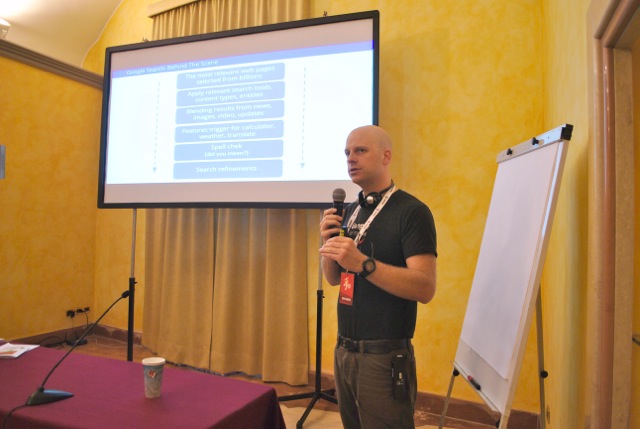Google’s Media Outreach Lead, American Nicholas Whitaker on Search, Trends and why his job makes a difference to journalists

Ask Nicholas Whitaker what his job is, and he’ll tell you he’s the Media Outreach Lead at Google. Ask him what is passion is, he’ll tell you: “to educate”. So when he kicked off his masterclass on the use of Google’s Search and Trends at this year’s International Journalism Festival in Perugia, Italy, he did it in an easy-to-grasp and engaging manner.
And he certainly started with the basics.
“Has anyone done a search on Google before?” he asked, his question followed by chuckles from the audience and quite a few hands shooting up in the air as a sign of approval. “Good.”
Whitaker’s workshop was a one-hour session, which brought together a good 60-70 participants in Perugia’s Hotel Brufani, and introduced them to the main uses of Google Image and Advanced Search, as well as Google Trends and Google Public Data, among others. It was certainly an hour packed with information, yet Whitaker’s witty (no pun intended!) approach to presenting and his sociable personality made it easy to process.
“I was not born a search guru,” he said. “I spent a lot of time with the products and got to know them.”
In fact, back in 2010 when he took on the job at Google, he was far from it. The decade prior he spent as a freelance video producer with his own company, covering a variety of topics, from technology to advocacy.
“I was in New York City, starting to get worked out, so I was looking for other places to put my skills into,” he said in an interview following the workshop. A friend clued him into the job opening with Google Earth and Maps while they caught up over drinks on his roof. Perhaps it might interest one of Whitaker’s students?
“They are looking for somebody to create training videos and tutorials for Google.” Whitaker ended up taking the job for himself.
Using Google as a journalist
From the beginning, Google’s goal has been to “understand exactly what you mean and give you back exactly what you want,” Whitaker quoted one of Google’s founders. “I like to adapt it to say: ‘understand exactly what you mean and give you back exactly what you need.’”
For one, journalism articles need images. There are various ways to look for the photos a journalist really needs – from name, size and format, to date, region, and perhaps even more importantly, copyright information.
“Every time a photo is uploaded, it goes online with all of its metadata,” said Whitaker. A Google Image Search can also help verify when and where on the internet this photo was published and re-published. Still, caution is advised. “There is no guarantee that somebody would not download that same photo on to their computer and alter the metadata,” Whitaker warned. “We live in a digital world after all.”
But it is this digital world that helps journalists in their day-to-day work. As often happens to many, there are times when names, or titles, or places – you name it – need looking up. In these cases, Google Advanced Search may well become one’s best friend – only second to your dog, of course, and according to Whitaker, “it’s one of the hidden gems of Google”.
Google Trends is the reason for a journalist to write at all. It’s “putting your finger on the pulse of what people are searching for,” said Whitaker, “a snapshot look at what the world is searching for at any given time.
The tools include “Trending Now”, “Top Charts” and “Explore In-Depth”, all of which provide insight into who is searching what, where, and at any given moment in time.
Having an understanding of that search behavior is crucial. Google Trends is both a research tool and a platform that allows you to see into the minds of your audience, even if only for a moment.
But what is Whitaker’s favorite tool?
“That’s really hard,” he said, ultimately deciding on Google Public Data, pointing out that it helps tell stories, and he uses it in his own career.
Whitaker travels all over the world as a part of the Google for Media Team. Wherever he goes, he “regionalizes” his presentations for that specific area. Here in Perugia, for example, he pointed out the trending topics in Italy – currently the canonization of John XXIII and John Paul I – and presented basic info about the city. “They have really good chocolates,” he added, referring to the famous Perugina truffles.
The library of data sources that is Google Public Data comes in multiple languages and allows you to work with datasets like population change, birth rates or GDP, among others. “It really paints a picture about a particular region just by providing information,” Whitaker said.
Educating those who want to be heard
Last year Whitaker was giving a conference for journalists in Jordan, where he said the effect of his work comes in a unique form.
“Journalism there has a very different feel to it… because there’s such earnestness, such jeopardy,” he pointed out. “Journalism means so much more to them because it’s really the voice of the people, it’s the voice of freedom.”
Whitaker provides the tools for journalists like these, desperate to learn more information in order to express themselves and publicize their opinions.
He is an educator – that’s his passion – and journalists all over the world are his students, hungry to learn.
Those here at the Sala Perugina in the Hotel Brufani have also become his students for a day, and Whitaker asks one question of the audience to ensure that he’s done his job properly:
“So is everybody a Google expert now?”